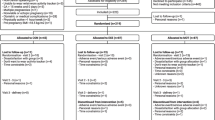Abstract
Pregnancy exercise can prevent excessive gestational weight gain (EGWG), gestational diabetes mellitus (GDM) and hypertension (GH), but inter-individual variability has not been explored. We aimed to analyze the prevalence––and potential sociodemographic and medical predictors of––non-responsiveness to gestational exercise, and the association of non-responsiveness with adverse pregnancy outcomes. Among 688 women who completed a supervised light-to-moderate intensity exercise program (three ~1-h sessions/week including aerobic, resistance, and pelvic floor muscle training) until near-term, those who showed EGWG, GDM or GH were considered ‘non-responders’. A low prevalence of non-responders was observed for GDM (3.6%) and GH (3.4%), but not for EGWG (24.2%). Pre-pregnancy obesity was the strongest predictor of non-responsiveness for GH (odds ratio 8.40 [95% confidence interval 3.10–22.78] and EGWG (5.37 [2.78–10.39]), whereas having a highest education level attenuated the risk of being non-responder for GDM (0.10 [0.02–0.49]). Non-responsiveness for EGWG was associated with a higher risk of prolonged labor length, instrumental/cesarean delivery, and macrosomia, and of lower Apgar scores. No association with negative delivery outcomes was found for GDM/GH. In summary, women with pre-pregnancy obesity might require from additional interventions beyond light-to-moderate intensity gestational exercise (e.g., diet and/or higher exercise loads) to ensure cardiometabolic benefits.
Similar content being viewed by others
References
Deputy N, Sharma A, Kim S, Hinkle S. Prevalence and characteristics associated with gestational weight gain adequacy. Obstet Gynecol. 2016;125:773–781.
Goldstein RF, Abell SK, Ranasinha S, Misso M, Boyle JA, Black MH, et al. Association of gestational weight gain with maternal and infant outcomes: a systematic review and meta-analysis. JAMA. 2017;317:2207–2225.
Perales M, Artal R, Lucia A. Exercise during pregnancy. JAMA. 2017;317:1113–1114.
Tobias DK, Stuart JJ, Li S, Chavarro J, Rimm EB, Rich-Edwards J, et al. Association of history of gestational diabetes with long-term cardiovascular disease risk in a large prospective cohort of US women. JAMA Intern Med. 2017;177:1735–1742.
Behrens I, Basit S, Lykke JA, Ranthe MF, Wohlfahrt J, Bundgaard H, et al. Association between hypertensive disorders of pregnancy and later risk of cardiomyopathy. JAMA. 2016;315:1026–1033.
Palinski W. Effect of maternal cardiovascular conditions and risk factors on offspring cardiovascular disease. Circulation. 2014;129:2066–2077.
Mottola MF, Davenport MH, Ruchat SM, Davies GA, Poitras V, Gray C, et al. 2019 Canadian guideline for physical activity throughout pregnancy. Br J Sports Med. 2018;52:1339–1346.
Perales M, Valenzuela PL, Barakat R, Cordero Y, Peláez M, López C, et al. Gestational exercise and maternal and child health: effects until delivery and at post-natal follow-up. J Clin Med. 2020;9:379.
Álvarez C, Ramírez-Campillo R, Ramírez-Vélez R, Izquierdo M. Effects and prevalence of nonresponders after 12 weeks of high-intensity interval or resistance training in women with insulin resistance: a randomized trial. J Appl Physiol. 2017;122:985–996.
Álvarez C, Ramírez-Campillo R, Cristi-Montero C, Ramírez-Vélez R, Izquierdo M. Prevalence of non-responders for blood pressure and cardiometabolic risk factors among prehypertensive women after long-term high-intensity interval training. Front Physiol. 2018;9:1–13.
Ruiz JR, Perales M, Pelaez M, Lopez C, Lucia A, Barakat R. Supervised exercise-based intervention to prevent excessive gestational weight gain: a randomized controlled trial. Mayo Clin Proc. 2013;88:1388–1397.
Borg G. Borg’s perceived exertion and pain scales. 7th ed. Champaign: Human Kinetics; 1998.
Evenson KR, Barakat R, Brown WJ, Dargent-Molina P, Haruna M, Mikkelsen EM, et al. Guidelines for physical activity during pregnancy: comparisons from around the world. Am J Lifestyle Med. 2014;8:102–121.
Institute of Medicine. Weight gain during pregnancy: reexamining the guidelines. Washington, DC: National Academic Press; 2009.
American Diabetes Association. Gestational diabetes mellitus. Diabetes Care. 2004;27:S88–90.
Williams B, Mancia G, Spiering W, Rosei EA, Azizi M, Burnier M, et al. 2018 ESC/ESHGuidelines for themanagement of arterial hypertension. Eur Heart J. 2018;39:3021–3104.
Heinze G, Dunkler D. Five myths about variable selection. Transpl Int. 2017;30:6–10.
Amorim AR, Rössner S, Neovius M, Lourenço PM, Linné Y. Does excess pregnancy weight gain constitute a major risk for increasing long-term BMI? Obesity. 2007;15:1278–1286.
Sava RI, March KL, Pepine CJ. Hypertension in pregnancy: taking cues from pathophysiology for clinical practice. Clin Cardiol. 2018;41:220–227.
Melchiorre K, Thilaganathan B, Giorgione V, Ridder A, Memmo A, Khalil A. Hypertensive disorders of pregnancy and future cardiovascular health. Front Cardiovasc Med. 2020; 7. https://doi.org/10.3389/fcvm.2020.00059.
Garnæs KK, Mørkved S, Salvesen Ø, Moholdt T. Exercise training and weight gain in obese pregnant women: a randomized controlled trial (ETIP Trial). PLoS Med. 2016;13:1–18.
Yeo SA, Walker JS, Caughey MC, Ferraro AM, Asafu-Adjei JK. What characteristics of nutrition and physical activity interventions are key to effectively reducing weight gain in obese or overweight pregnant women? A systematic review and meta-analysis. Obes Rev. 2017;18:385–399.
Suliga E, Rokita W, Adamczyk-Gruszka O, Pazera G, Cieśla E, Głuszek S. Factors associated with gestational weight gain: a cross-sectional survey. BMC Pregnancy Childbirth. 2018;18:1–11.
Gante I, Ferreira AC, Pestana G, Pires D, Amaral N, Dores J, et al. Maternal educational level and the risk of persistent post-partum glucose metabolism disorders in women with gestational diabetes mellitus. Acta Diabetol. 2018;55:243–251.
Bouthoorn SH, Silva LM, Murray SE, Steegers EAP, Jaddoe VWV, Moll H, et al. Low-educated women have an increased risk of gestational diabetes mellitus: the Generation R Study. Acta Diabetol. 2015;52:445–452.
Acknowledgements
The work of PLV is supported by University of Alcalá (FPI2016). The work of AL is supported by the Spanish Ministry of Economy and Competitiveness and Fondos FEDER (PI15/00558 and PI18/00139). We sincerely thank all participants for their collaboration in this study.
Author information
Authors and Affiliations
Corresponding author
Ethics declarations
Conflict of interest
The authors declare that they have no conflict of interest.
Additional information
Publisher’s note Springer Nature remains neutral with regard to jurisdictional claims in published maps and institutional affiliations.
Rights and permissions
About this article
Cite this article
Perales, M., Valenzuela, P.L., Barakat, R. et al. Obesity can offset the cardiometabolic benefits of gestational exercise. Int J Obes 45, 342–347 (2021). https://doi.org/10.1038/s41366-020-00669-2
Received:
Revised:
Accepted:
Published:
Issue Date:
DOI: https://doi.org/10.1038/s41366-020-00669-2
- Springer Nature Limited




